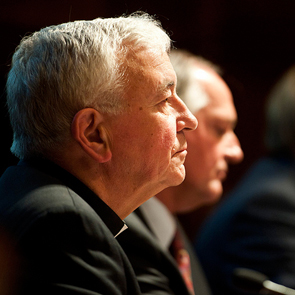A Catholic charity has accused the Chancellor of the Exchequer, George Osborne, of “failing the poorest” in his Budget which was announced today.
Caritas Social Action Network (CSAN), the social action arm of the Church in England and Wales, said that the Government failed to tackle poverty in a Budget Mr Osborne said was for “makers, doers and savers”.
The Chancellor announced that welfare spending would be capped at £119bn in 2015-16, excluding state pensions and unemployment benefits, and after that would rise in line with inflation.
Responding to the announcement, CSAN Chief Executive Helen O’Brien said: “For another year the value of Working Tax Credits, Child Benefit and many disability allowances will decline in real terms. People are already experiencing hardship as a result of this policy and there is a very real danger that it will be compounded by the planned cap on welfare spending.”
“The only consistency we’re seeing is a worryingly inconsistent approach to tackling poverty,” she added.
The Church of England-linked Children’s Society said that the “arbitrary” cap on welfare spending failed to take into account the circumstances of poor families struggling with the rising cost of living.
“The Government is effectively transferring the risk of rising costs to children and families already struggling to make ends meet,” said Matthew Reed, the charity’s chief executive.
Mr Reed welcomed a rise in the personal tax allowance to £10,500 and an increase in the higher rate threshold to £41,864, but said that these measures would do little to help working families who relied on welfare to top up their earnings. “The vast majority of this [rise] will be deducted from their benefits – giving with one hand while taking with the other,” he said.
Savers will be able to profit from a new £15,000 annual limit on ISAs, which will be introduced in July.
Mr Osborne also announced the allocation of £20 million for cathedrals to pay for repairs ahead of the First World War commemorations later this year. Anglican MP Frank Field, Chairman of the Cathedrals Fabric Commission for England, said that the money would be spent on Catholic as well as Anglican cathedrals.
Meanwhile Cardinal Vincent Nichols called for a “deep cultural change” in the ways that businesses operate, saying they must serve the common good and show greater respect for human dignity.
In an article published to coincide with today’s Budget, Cardinal Nichols wrote: “A deep cultural change in how business serves society is both possible and necessary for the common good. We should all heed [Pope Francis’] plea: ‘I ask you to ensure that humanity is served by wealth and not used by it.’”
Cardinal Nichols, who last month sparked controversy by saying levels of destitution created by welfare reforms were “a disgrace”, argued that lasting change in business must be brought about by a commitment to serving the common good.
“Listening to these business leaders and working with them I have become convinced that a key to lasting change is for any business to define and express its clear guiding purpose which is shared by all in the enterprise and against which they are willing to be measured,” he wrote in the Huffington Post. “This fundamental requirement is not antipathetic to profit, as a purpose driven business can deliver a fair return for responsible investors through activities which themselves respect human dignity and serve the common good.”
He said he set up his Blueprint for Better Business initiative in 2012 after business leaders voiced concerns to him about a breakdown of trust between business and society. He said this link could be restored through the recovery of a sense of purpose.
He added: “The core purpose of a business needs to be specific enough to enable the company leadership to direct its activities to producing goods that are truly good, services that truly serve, and acting deliberately over time not only to minimise harm but to enhance the broader wellbeing of all those it touches.”
Above: Then-Archbishop Nichols alongisde Unilever CEO Paul Polman at the inaugural Blueprint for Better Business conference in 2012




 Loading ...
Loading ...